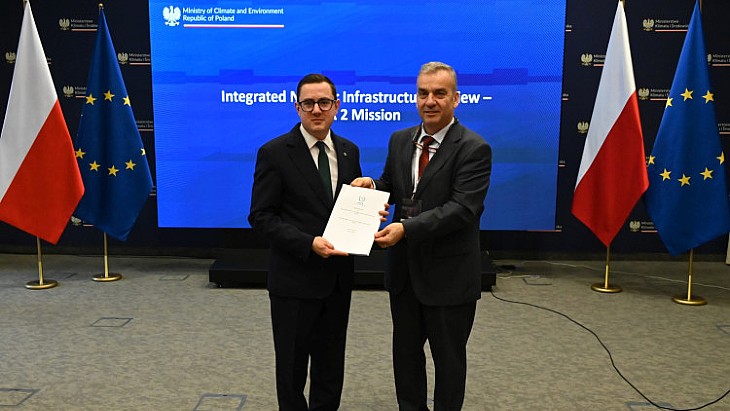The 11-day IAEA mission to Poland - a Phase 2 Integrated Nuclear Infrastructure Review - took place from 15 to 25 April at the invitation of the Polish government and used the IAEA's Milestones Approach to review the status of 19 nuclear infrastructure issues. The aim is the check the readiness of a country to invite bids or negotiate a contract for their first nuclear power plant.
The 10-person team "identified good practices that would benefit other countries developing nuclear power in the areas of contracting approach, strategic approach to funding, early authorisation of technical support organisations to support the nuclear regulator, engagement with the electrical grid operator, stakeholder involvement and industrial involvement".
Mission team leader Mehmet Ceyhan, Technical Lead of the IAEA Nuclear Infrastructure Development Section, said: "The Polish Nuclear Power Programme (PNPP) was initiated with clear objectives and is progressing towards the construction stage in a structured way. We observed strong and dedicated teams in each of the key organisations that will help to achieve the government’s objectives for the PNPP."
Among the areas highlighted for further action was "the need to further review its legal and regulatory framework, and finalise the preparatory work required for the contracting and construction stages".
Miłosz Motyka, Undersecretary of State for the Ministry of Climate and Environment of Poland, said: "Poland's cooperation with the IAEA is a long-term collaboration, and the review mission is extremely valuable and beneficial for the implementation and execution of the Polish nuclear power programme."
The collaboration with the IAEA also involved a September 2023 Integrated Regulatory Review Service mission to the country which found Poland's nuclear regulatory framework met IAEA safety standards.
Field work getting under way
Meanwhile, a symbolic kick-off ceremony was held by US-firm Bechtel at its Warsaw office to mark the start of geological surveys for Poland's first nuclear power plant at the Lubiatowo-Kopalino site in the Pomeranian municipality of Choczewo.
Bechtel is a member of the US consortium responsible for the implementation of the nuclear power plant project which is set to feature three Westinghouse AP1000 units. The field work is due to start in May on an area covering about 30 hectares with approximately 220 research points being constructed with depths of 20 to 210 metres. Bechtel has awarded the contract for the geological work to PSD Poland, with the work expected to be completed in November.
The findings will be crucial for the earthworks design for the plant and will also inform the Location Report which Polskie Elektrownie Jądrowe (PEJ) will need to submit to obtain a construction permit from Poland's National Atomic Energy Agency, the PPA.
The event was attended by the US Ambassador to Poland Mark Brzezinski, who called it "another important step forward as Poland and the United States work together to create a civil nuclear industry in Poland, and it shows that the United States is delivering on our shared commitment to Poland’s energy security and supporting Poland’s energy transition".
Leszek Hołda, Bechtel Poland Country Manager, said: "The commencement of the initial fieldwork for the construction of this plant is a significant moment for the Polish economy, the companies that will participate in the supply chain, and the local community."
Leszek Juchniewicz, a member of the board of directors and acting president of PEJ, said this was an important time for the enterprise and showed that "the project to build Poland's first nuclear power plant is gaining momentum".
Project background
PEJ - a special-purpose vehicle 100% owned by the State Treasury - is responsible for the construction project of the first nuclear power plant in Poland.
In November 2022, the then Polish government selected the Westinghouse AP1000 reactor technology. An agreement setting a plan for the delivery of the plant was signed in May last year by Westinghouse, Bechtel and PEJ. The Ministry of Climate and Environment in July issued a decision-in-principle for PEJ to construct the plant. The aim is for Poland's first AP1000 reactor to enter commercial operation in 2033.
Under an engineering services agreement signed in September last year, in cooperation with PEJ, Westinghouse and Bechtel will finalise a site-specific design for a plant featuring three AP1000 reactors. The design/engineering documentation includes the main components of the power plant: the nuclear island, the turbine island and the associated installations and auxiliary equipment, as well as administrative buildings and infrastructure related to the safety of the facility. The contract also involves supporting the investment process and bringing it in line with current legal regulations in cooperation with the PAA and the Office of Technical Inspection.





_53504.jpg)

_13505.jpg)
_87975.jpg)






